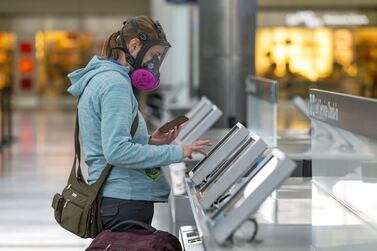Shanghai replaced London as the most connected city in the world, according to the latest rankings by the International Air Transport Association (Iata).
London, which was at the top of last year's rankings, slipped to eighth position this year due to a 67 per cent decline in connectivity as the coronavirus pandemic continues to dent travel demand to and from the UK capital. This meant Shanghai moved up to the top spot, from second position last year.
“The dramatic shift in the connectivity rankings demonstrates the scale at which the world’s connectivity has been re-ordered over the last months,” Sebastian Mikosz, Iata’s senior vice president for member external relations, said on Thursday.
“But the important point is that rankings did not shift because of any improvement in connectivity. That declined overall in all markets. The rankings shifted because the scale of the decline was greater for some cities than others.”
New York, which was the third-most connected city last year, is not placed in this year's top 10. Chinese cities dominate the rankings, taking five of the top 10 spots. Beijing is listed in second place, Guangzhou is third, Chengdu is fourth and Shenzhen is in sixth place, with Chicago being the only non-Chinese city in the top five.
Tokyo, Bangkok, Hong Kong and Seoul have also dropped out of this year's top 10 rankings.
“In a short period of time, we have undone a century of progress in bringing people together and connecting markets. The message we must take from this study is the urgent need to re-build the global air transport network,” Mr Mikosz, said.
China has been the first major global economy to recover from the Covid-19 pandemic as the government takes measures to keep the epidemic under control. As of Thursday, the number of infections in China reached 86,490 with 4,634 deaths, according to Worldometer. In the US, total infections have now topped 13.1 million and more than 268,000 deaths have been recorded.
Although the global economy is facing its worst recession since the Great Depression, with global output expected to shrink 4.4 per cent this year, the Chinese economy is forecast to grow 1.9 per cent.
Europe and Africa are the two hardest-hit regions in terms of connectivity declines, with both reporting drops of 93 per cent. In Latin American connectivity fell 91 per cent, In the Middle East it was 88 per cent and Asia-Pacific declined 76 per cent. Traffic across North America fell 72 per cent.
“The systematic testing of travellers is the immediate solution to rebuilding the connectivity that we have lost. The technology exists. The guidelines for implementation have been developed. Now we need to implement before the damage to the global air transport network becomes irreparable,” Mr Mikosz said.
Iata's air connectivity index measures how well connected a country’s cities are to other cities around the world, which is deemed vital for trade, tourism, investment and other economic flows.
The index is a composite measure reflecting the number of seats flown to the destinations served from a country’s major airports and the economic importance of those destinations.








